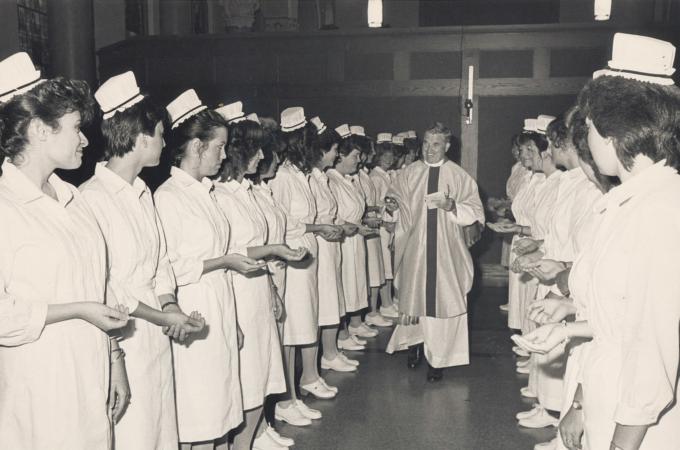Alumni keep St. Elizabeth Hospital School of Nursing spirit alive
BRAINTREE -- It has been nearly 20 years since St. Elizabeth Hospital School of Nursing in Brighton closed its doors in 2000, but the hundreds of graduates who make up the school's alumni association haven't let its memory fade.
The St. Elizabeth Hospital School of Nursing Alumni Association was founded in 1906, about 11 years after a group of Franciscan Sisters opened the school in 1895. It has seen change over the years, including being reorganized in the 1940s by Cardinal Richard Cushing to better promote the nursing profession, but at its core it has remained the same: a place for alumni to reconnect and to recall fond memories of their time as nursing students.
There are over 750 active members in the association, according the association's president, Annette Walsh McGourty. The ages span decades -- the oldest are members of the graduating class of 1940, and the youngest were in the class of 2000, the school's final year.
Members pay yearly dues, and keep connected through a website and a Facebook group. They hold two large events a year -- a luncheon in the spring, and a brunch and Mass in the fall.
It all serves as a way for friends, colleagues, classmates to keep in touch, and network with other nursing professionals, said McGourty, speaking to The Pilot April 3.
Part of class of 1968, McGourty said it was always the people, her fellow students and instructors, that she has been able to remember best about the school.
They were always there for each other, she recalled.
"There were times where you might not have done so well in an exam or had a bad day on the floor or a patient expired and you were heartbroken about that," and someone would extend a comforting hand, she said.
That was how she remembers the teachings of the school, too.
As the name suggests, St. Elizabeth Hospital School of Nursing was born out of St. Elizabeth Hospital, now St. Elizabeth Medical Center, in Brighton. Founded in 1868 by five Catholic who were women members of the third order of St. Francis, the hospital provided care and shelter for sick immigrant women and for "retired and feeble women in domestic service." It expanded its services several years later to include care for men, and in 1895 the School of Nursing was created.
It offered a three year nursing program when it opened, which moved to a two year program in the years before it closed. The school, at least when she was a student, was progressive in its teachings, McGourty said, something she didn't notice until later graduating and working alongside other nurses.
It was "progressive in the holistic approach to care of the patient," she explained. "It wasn't just the body and mind of the patient, but it was the spiritual side of the patient that we were educated in, too."
Each morning, the nursing students would attend Mass or prayer, often assigned to give communion with the priest. They said prayers over each patient that came in, although McGourty noted that remained respectful of patients from different faiths.
McGourty said she continued to try to pray for patients in her care when she was a critical care nurse. Now retired, McGourty worked in critical care for 38 years before spending the last nine years of her working life in quality management.
Her role as president of the alumni association does keep her busy, though. The association's next event, a luncheon on April 29, will see McGourty's class of '68 honored as the 50th jubilee class. The class with talk to the alumni gathered about their accomplishments, and will present the association with a monetary gift.
The event happens annually, and the gifts, explained McGourty, help fund the association's several scholarships, which are yearly given to alumni, or in some cases kin of alumni, who wish to pursue further education in the nursing field. It's a way to help the younger alumni, said McGourty, while promoting the vocation of nursing.
In Boston College's Burns Library, a collection of things from the former school and its alumni are being preserved. Class books, pins, gowns, and other artifacts donated by the association can all be found there, said McGourty, and the inventory keeps growing.
"They're holding on to what was ours," she said, when asked why such items are being preserved. "We need to continue that, so other nursing students can understand the life of a nurse back then."
The students can look and see the nurses who have come before them, trace "through the years the type of nursing that they did, what they were able to accomplish," and help keep alive a school they have never known.



















